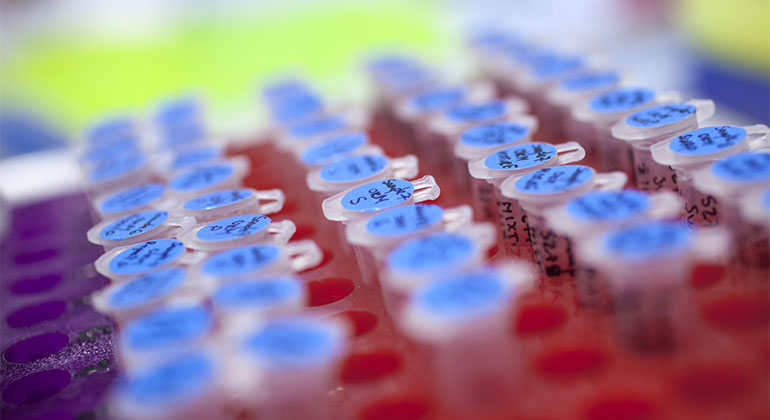Cancer Patients With Poor Antibody Response to COVID-19 Vaccines Also Lack Secondary Immune Response, Study Shows
Scientists previously thought patients might mount T cell responses as a second-line protection

Patients with the blood cancer multiple myeloma often mount a poor antibody response to COVID-19 vaccines. Mount Sinai researchers have now discovered that these patients also have a weak response from a different part of the immune system, known as T cells. Their discovery was published in a research letter in Cancer Cell in October.
In a trial of 44 patients with multiple myeloma, those with low or no antibody response to the COVID-19 mRNA also had few or no T cells that could have protected them from a severe COVID-19 infection. T cells are an important component of the immune system and play a central role in the body’s ability to fight off infections, and researchers had believed they might respond even in people with a poor antibody response.
“The unexpected lack of T cell responses, coupled with the absence of antibodies following SARS-CoV-2 vaccination, is of concern and emphasizes the need for serological testing post-vaccination to identify these patients,” said lead author Samir Parekh, MD, Director of Translational Research in Multiple Myeloma at The Tisch Cancer Institute at Mount Sinai and Professor of Medicine (Hematology and Medical Oncology), and Oncological Sciences, at the Icahn School of Medicine at Mount Sinai. “With the current rapid spread of a more transmissible viral variant, the Delta variant, booster vaccination, continuing safety precautions, and passive antibody treatments should be considered to prevent severe disease and death in multiple myeloma patients with poor vaccine responses.”
This study was the first to analyze patients with multiple myeloma and compare their T cell responses to COVID-19 proteins to those in a control group of healthy people. Approximately 96 percent of patients with detectable antibodies against the “spike” protein—an important component of SARS-CoV-2, the virus that causes COVID-19, and a frequent target of vaccines—had detectable COVID-19-specific T cell responses; in contrast, only 35 percent of the patients who had no detectable antibodies had a T cell response. Fewer patients on certain multiple myeloma therapies that impact the immune system had a T cell response compared to those on other therapies.
The team of Mount Sinai researchers continue to study the durability of antibody and T cell responses of these patients after COVID-19 mRNA vaccines and boosters. These findings show that with the current rapid spread of more transmissible viral variants, such as the Delta variant, patients with immune system disorders, including multiple myeloma, should work with their doctors and understand their risk and response to the COVID-19 vaccines. Researchers believe this study underscores high-risk patients’ need for booster vaccination and continued safety precautions such as masking and social distancing.
About the Mount Sinai Health System
Mount Sinai Health System is one of the largest academic medical systems in the New York metro area, with more than 43,000 employees working across eight hospitals, over 400 outpatient practices, nearly 300 labs, a school of nursing, and a leading school of medicine and graduate education. Mount Sinai advances health for all people, everywhere, by taking on the most complex health care challenges of our time — discovering and applying new scientific learning and knowledge; developing safer, more effective treatments; educating the next generation of medical leaders and innovators; and supporting local communities by delivering high-quality care to all who need it.
Through the integration of its hospitals, labs, and schools, Mount Sinai offers comprehensive health care solutions from birth through geriatrics, leveraging innovative approaches such as artificial intelligence and informatics while keeping patients’ medical and emotional needs at the center of all treatment. The Health System includes approximately 7,300 primary and specialty care physicians; 13 joint-venture outpatient surgery centers throughout the five boroughs of New York City, Westchester, Long Island, and Florida; and more than 30 affiliated community health centers. We are consistently ranked by U.S. News & World Report's Best Hospitals, receiving high "Honor Roll" status, and are highly ranked: No. 1 in Geriatrics and top 20 in Cardiology/Heart Surgery, Diabetes/Endocrinology, Gastroenterology/GI Surgery, Neurology/Neurosurgery, Orthopedics, Pulmonology/Lung Surgery, Rehabilitation, and Urology. New York Eye and Ear Infirmary of Mount Sinai is ranked No. 12 in Ophthalmology. U.S. News & World Report’s “Best Children’s Hospitals” ranks Mount Sinai Kravis Children's Hospital among the country’s best in several pediatric specialties.
For more information, visit https://www.mountsinai.org or find Mount Sinai on Facebook, Twitter and YouTube.

Diabetes May Accelerate Blood Cancer Growth, Yet Survival Outcomes Differ by Race
Sep 29, 2023 View All Press Releases